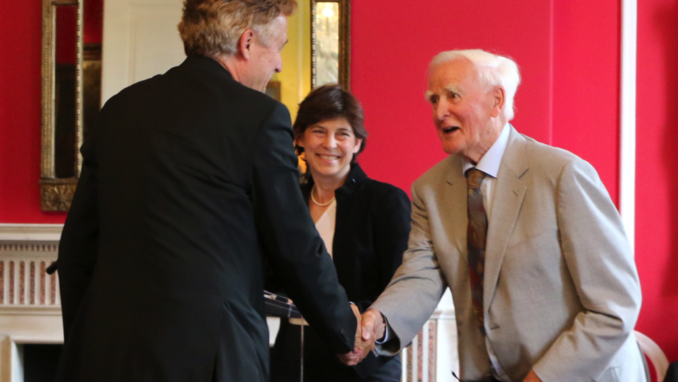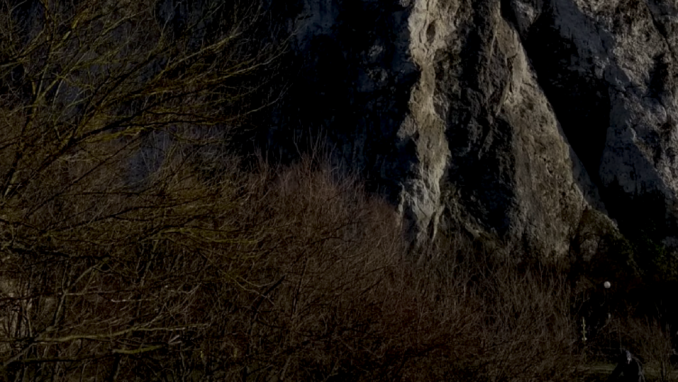
Ambassador Ammon and John le Carré, The German Embassy – Licence CC BY-SA 2.0
A while ago this reviewer attended a lecture. The subject was ten books that had changed the world. Delivered by Melvyn Bragg, author of a work of the same name, having been talked through three or four significant titles, we were invited to ask questions.
A lady raised her hand, “What book that changed the world hasn’t been written yet?”
Clever. Too clever for the rest of us. We were all a bit baffled.
Melvyn replied that his time was taken up with books that had already been written and that there wasn’t enough left in the tank for ones that hadn’t. Upon reflection, perhaps you can see what she was getting at. Do we need a Great Novel about the Brexit Trump age? And if so, is it ‘Agent Running in the Field’ by John le Carré?
‘Agent Running’ is a standard espionage thriller, nicely told and crafted, cleverly plotted with formulaic characters. A bit of West bashing and identity politics is thrown in too. Rather than a top-class le Carré, it plots and suspends like a decent episode of a generic online box set.
Whether you’re a fan of Daniel Craig’s 007 or not (I am), he’s not really Bond. No matter what your opinion of David Cameron, he wasn’t a Conservative. Likewise, ‘Agent Running’ isn’t quite a le Carré. Nicely written, it is clever in parts but one or two things jump conveniently ex Machina and the beginning of the novel is never explained beyond remarkable co-incidence.
Le Carré seems to have lived his literary life backwards, starting with gritty realistic Cold War thrillers (deep in detailed tradecraft) and ending with a dollop of impulsive schoolboy politics. Imagine you looked forward to a man to man talk with your granddad but he just wanted to chat about Morrissey.
Le Carré continues his obsession with cringing character description through convoluted ethnic origin. Why does everyone have to be a White Russian with a bit of German blood via a non-conformist granny in a Gallic hinterland? Female characters continue to be thinly and stereotypically drawn. They went to Cheltenham Ladies college, they wear baggy clothes, they marry out of the blue. They are aided and abetted by an unnecessary list of ‘quares’ (many of them “married” too), in a way that adds nothing to their character or the plot. These appear to be labels that have to be attached, as the author belatedly dips his toe into the woke.
Our storyteller in this first-person narrative is Nat. As the title of the book suggests, he runs agents in the field, loves his profession and is used to being out in that field, managing our espionage assets overseas. By his 47th birthday, he has been in Moscow, Budapest, Prague, Helsinki, Trieste et al, all with his badminton racket in tow. As we join the story, he’s back in London, too old to crawl through the swamp with a dagger between his teeth, he will be made redundant next week. However, he isn’t too old to be top of the badminton league at his Battersea gym, where, in that inexplicable co-incidence, he is very publicly challenged to a match by an awkward young stranger called Ed. Ed is a character stolen from the BBC’s W1A (dippy Will Humphries) but from oop the north where, le Carré reminds us, everybody’s related to a coal miner. Ed keeps on saying, “Yeah”. Our 88-year-old author is down with the youth. Throughout the book, he has also fallen in love with the F word.
Meanwhile, at chez Nat, Mrs Nat, Prue, is a partner in an “old-established” London solicitors, yawn, fighting big Pharma, mega yawn. On weekends and Monday evenings she handles her pro bona human rights cases, jaw dislocating yawn. Unlock your mandible and keep on reading. Prue develops nicely.
When not engaged in the secret world, Nat and Prue read The Guardian and watch Channel Four News. Is the critical mass of Channel Four News viewers sufficient to allow such a thing to happen? The ratings are awful. Like an endangered species at the bottom of the ocean, are there enough Channel Four News viewers for two to bump into each other and mate? Apparently, there are. Surely Monsieur le Carré doesn’t get paid to promote such things? There are also one or two suspiciously unnecessary brand names mentioned elsewhere. Tell me it isn’t true.
Meanwhile, at the Office (with a capital ‘O’, as that’s what we’re calling the Secret Service), Moira in HR points Nat towards a new but familiar job, running agents here in the UK under a boss he dislikes, Dom Trench, in a run-down and neglected section called the Haven. Dom has relatives in the Tory party, boo. Partly at home and partly at Bristol University, is Nat and Prue’s only child Steph, who verges towards being out of control but in a very Putney kind of way. Not so much gang warfare, more mild embarrassment on teacher’s nights.
Suffice it to say, all sorts of bits and pieces crop up in the little cul-de-sac at the Haven, which begin to look like a big operation worth pursuing. Away from work, Nat’s social life involves little more than those very competitive games of badminton with Ed, followed by après piste politics chinwags in the gym bar.
It is difficult to believe now, but pre-pandemic the background music was all about Brexit and Trump, for which le Carré reserves a remarkable amount of bile. Also in the firing line, is the un-named Foreign Secretary who, at the time of writing, will have been Alexander Boris de Pfeffel Johnson. Far more bile than, across the sixty years of his writing career, le Carré ever was able to aim at mass murderers such as Mao, Stalin or Bin laden. Incidentally, how are we going to fight the coronavirus without big Pharma? With imported bespoke Hoxton breakfast cereals?
Le Carré also includes a never-ending heatwave, in order to drop global warming into the story. Not so much gently, as onto our toes as if an anvil. Yes, in-between times, the author spends too much time apologising for winning the Cold War, and yes, he mentions ethnicity too often and yes, he keeps on irritating the reader saying “yes” before stating the self-evident.
This reviewer finds it impossible to dislike le Carré, no matter how much the author dislikes me and my generation of Englishmen. Le Carré now dislikes Christianity so much that he writes of ‘Petersburg’ rather than ‘Saint Petersburg’. Odd. It’s rather like being beaten up by one of your own supporters at a football match, not nice but you’re still a fan.
Given that le Carré’s world is inhabited by English gentlemen enjoying treble whiskeys over Kalamata olives, while sat in cracked leather chairs, why does he hate us?
Does he have more in common with upper-class elitists across the EUrocracy than he does with his fellow countrymen? Yes. Was he ever fighting the Soviet Union (with its rusty fleet and broken down tanks) or was he challenging the spread of a brand of populism known as Communism? Has, in the author’s mind, Communism been replaced by the populism of Brexit and Trump? Is le Carré motivated by love of his country and her people, or is he just a crushing snob terrified of the plebs?
With Trump in the Whitehouse and Britain having left the EU, we can laugh at the overindulged adolescent in the author, rather than let it spoil our reading.

© Always Worth Saying, Going Postal 2020
Having said that, there is a thin line between absorbing the reader into another world and simply over describing places and events. Is there a, ‘For God’s sake man get a bloody move on,’ meme showing a picture of the Prague bus plunging deeper into the darkness beneath steadily rising black hills either side of a night sky, leading one to ponder what one is doing here having reached inside and realised, not a fear of heights, rather a dislike of depths? One has talked oneself, as if a wildcat ….
Get on with it!
Rather quaint tradecraft helps the plot but not its credibility. Informed readers will have to try a bit harder than the le Carré usual to suspend disbelief. And yes, were stuck in London and yes, that means Hoxton and Battersea, and yes, we manage some good trips abroad and of course we go to the North and yes, le Carré gets the North wrong. It won’t bother you too much, as by this point the plot is starting to boil and the tension build.
A serious shortcoming of the book is that there isn’t enough of it. It has that knocked-out-for-Christmas feel about it. To paraphrase and misquote Ernest Bevin about the A-bomb,”We’ve got to have it by Christmas and we’ve got to have bloody ‘John le Carré’ along the spine.”
‘Agent Running in the Field’ hits the scales at 288 pages. The previous Christmas’s ‘Legacy of Spies’, 272. 2017’s ‘The Pigeon Tunnel’, 320 (although 8 of its 38 chapters had been previously published elsewhere). My favourite le Carré, ‘The Constant Gardener’ (2001) was 557 pages long, while a more widely accepted favourite, ‘A Perfect Spy’ (1986), 688.
As the books have become shorter, there has been below the line speculation that they are ghostwritten, something that the publisher would never admit to. The matter must be allowed to lie. I would wager that they are le Carré’s work but that he is either sleepwalking through their authorship, or his writing has become more of a collaborative effort. A brand to be developed, a profit to be made.
Speaking of last year’s offering, ‘A Legacy of Spies’, it featured George Smiley. Although Smiley is an excellent character, previously, according to chapter one (A Brief History of George Smiley), in ‘Call for the Dead’, Smiley emerged from his (unimpressive) school ‘sometime in the twenties’. This would make him at least 106, possibly 116. Including a 116-year-old Smiley as part of the brand is just silly. They say that you should never meet your heroes. If they are authors, then there may be a point at which you must stop reading them.
In ‘Agent Running’, some of the important subplots and secondary characters just disappear. The central idea doesn’t develop at all, we’re simply informed of it. The Office has its first ‘woman of colour’. She is called Gita. She has one line, of no consequence. People appear from nowhere and monologue to Nat about what’s going on.
As for the Brexit Trump axis, only one side of the story is described. There is no sequence of events that challenges a London elite’s Remain view. Contradictory words aren’t put into anyone’s mouth. Too much Guardian and Channel Four News before bedtime for you, Mr le Carré sir.
Don’t let that put you off, it is a decent enough story well told. If you are disappointed, it is because he has set his bar high, we expect better from him. No, this isn’t a Great Novel about Brexit Trump, or anything else. It is a decent read that has been knocked out for Christmas. Expect another in the last week of October 2020.
The Goodnight Vienna Audio file
Audio Player



